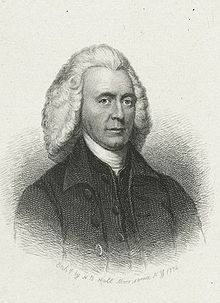Edmund Pendleton
| Edmund Pendleton | |
|---|---|

1872 engraving by H.B. Hall
|
|
| 1st Chief Justice of Virginia | |
|
In office December 24, 1788 – October 23, 1803 |
|
| Preceded by | Position established |
| Succeeded by | Peter Lyons |
| Personal details | |
| Born |
September 9, 1721 Caroline County, Colony of Virginia, British America |
| Died | October 23, 1803 (aged 82) Edmundsbury, Caroline County, Virginia, United States |
| Resting place | Bruton Parish Episcopal Church Cemetery, Williamsburg |
| Nationality | American |
| Political party | Federalist (informally) |
| Spouse(s) | 1st, Elizabeth Roy, 2nd, Sarah Pollard |
| Occupation | Lawyer, judge, delegate to First Continental Congress |
| Religion | Church of England/Episcopal |
Edmund Pendleton (September 9, 1721 – October 23, 1803) was a Virginia planter, politician, lawyer and judge. He served in the Virginia legislature before and during the American Revolutionary War, rising to the position of Speaker. Pendleton attended the First Continental Congress as one of Virginia's delegates alongside George Washington and Patrick Henry, and led the conventions both wherein Virginia declared independence (1776) and adopted the U.S. Constitution (1788). Unlike his sometime political rival Henry, Pendleton was a moderate who initially hoped for reconciliation, rather than revolt. With Thomas Jefferson and George Wythe, Pendleton revised Virginia's legal code after the break with Britain. To contemporaries, Pendleton may have distinguished himself most as a judge, particularly in the appellate roles in which he spent his final 25 years, including leadership of what is now known as the Supreme Court of Virginia. On hearing of his death, Congress agreed to wear badges of mourning for 30 days and expressed "their regret that another star is fallen from the splendid constellation of virtue and talents which guided the people of the United States, in their struggle for independence".
Pendleton was born in Caroline County to Mary Bishop Taylor, whose young husband (and father of her six other children), Henry Pendleton, had died four months earlier. Pendleton's maternal grandfather, James Taylor, was a large landowner in nearby Rappahannock County, and may have helped raise the children until the widow remarried Edward Watkins two years later. When Edmund was 14 years old, he became apprenticed to Benjamin Robinson, clerk of the Caroline County Court, which is where he learned about political issues and soon began reading law books and learning legal procedures. In 1737, Pendleton was made clerk of the vestry of St. Mary’s Parish in Caroline, which not only secured him a steady (though small) income, but also began his involvement with practical church-related matters which would continue throughout his life.
...
Wikipedia
